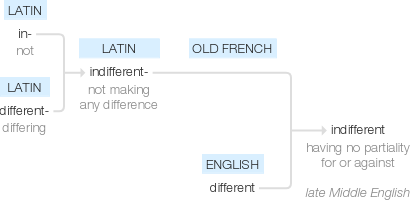Indifferent
late Middle English (in the sense ‘having no partiality for or against’): via Old French from Latin indifferent- ‘not making any difference’, from in- ‘not’ + different- ‘differing’ (see different).
wiktionary
From Old French indifferent, from Latin indifferens.
etymonline
indifferent (adj.)
late 14c., "unbiased, impartial, not preferring one to the other" (of persons), "alike, equal" (of things), from Old French indifferent "impartial" or directly from Latin indifferentem (nominative indifferens) "not differing, not particular, of no consequence, neither good nor evil," from in- "not, opposite of" (see in- (1)) + differens, present participle of differre "set apart" (see differ). Extended sense of "apathetic, no more inclined to one thing than to another" first recorded early 15c.; that of "neither good nor bad" is from 1530s, on notion of "neither more nor less advantageous," but since 17c. it has tended toward "rather bad."
